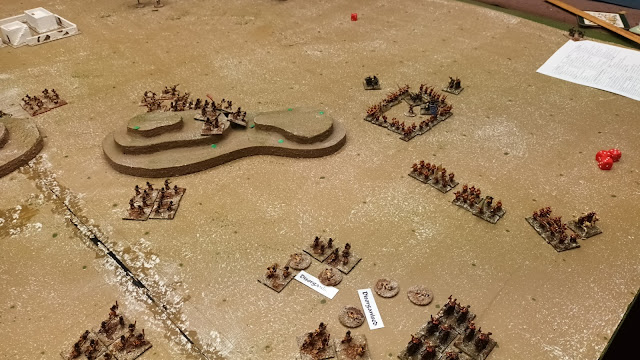As mentioned previously we went back to the Sudan this week. Alas Steve couldn't join us, so I had Tim, Chris K and Phil. I decided to revisit the "Redcoats and the Sudan" rules we last used a few years ago.
Chris and Phil took the British, who are at the far end of the table. They have to march to link up with the river expedition at the village, top left. Tim and I shared the Mahdists.
Chris and Phil adopted appropriate headgear, discussed a plan, disagreed, then Chris went along with Phil's idea. Which was to take the long way round. Possibly so he wouldn't have to stretch across the table.I had the cavalry on that flank. I misjudged the distances between the units, and Phil routed one of my mounted Rubs immediately. "RatS" uses playing cards to determine unit movement sequence, which can make it a bit hairy at times. I should note here that I don't like the melee system. I wasn't sure before this game, but I've decided it needs to go.
Deciding to get in on the fun, Chris sent his cavalry across the rocky ridge. The British command started discussing when to form a square, and were in a little bit of a tangle. If only we'd been a bit closer.
Tim nearly surprised the cavalry in the hills with a surprise surge, but they were able to skip out of his way.
The British infantry started to form firing lines, confident that they could hold the Mahdists off with controlled firepower.
Chris' cavalry observed a Rub emerging from some trees, and went at them with the cold steel.
Several turns on and Chris has got himself into a square. His artillery is still out in the open, but he's nearly there. Phil's firing lines have been absolutely devastating. Tim's Rubs are moving slowly across the hills.
We brought up some more chaps, but it didn't get any better.
The end of turn count up revealed that the Mahdists had been defeated. We never even inflicted one hit.
Lessons learned? Well, the hand to hand rules are rubbish and need revisiting. They were originally written for Jacobites and don't quite work here. As to the scenario, I should have started us closer together and put a time limit on the British mission.
And given them a lot of wagons.










This is why I gave up on Colonials, it is just so hard to make a decent game of it.
ReplyDeleteIt can be. It's worth it when you get it right. The trick is to give the Imperial players just enough opportunities to make a complete mess of everything. Science v Pluck is the best approach, but it takes more time to set up.
DeleteColonial are indeed very tricky. I feel that something within the rules, terrain or victory conditions has to force a sub optimal decision on the colonial bods. They will always be looking, from the outset, to form a square or a line, at which point the game essentially ceases. Random activation or turn end; the natives choosing when melees happen; the colonial power forced to occupy too much space; requiring a link up between two colonial forces within a time limit; sudden loss of ammo; natives starting the scenario dangerously close to the enemy (Ntombe River) are all approaches I've taken to ensure that the colonial power has to spend time manoeuvring, which it would prefer to use blasting lumps out of the enemy. Some of these have been successful...but I've probably only had one wholly satisfactory game. Currently struggling with Vietnam games similarly - nothing to keep the Vietnamese in the field after they've inflicted a few casualties.
ReplyDeleteCheers
Andrew
I think "yes" to all of that. Time pressure and uncertainty are two of the key elements to even things up. Lots of baggage is a great leveller in the Sudan.
DeleteCreo que es muy difícil adaptar reglas a este tipo de guerras porque gran parte de la estrategia nativa podría ser hostigar, esconderse, emboscadas y otras cosas que la niebla de guerra no te permite realizar sin usar un árbitro.
ReplyDeleteBonita mesa y buen juego.
Saludos desde España.
MM
Yes., Using an umpire is probably essential when running a fair game, or even having an umpire controlled enemy. It does look nice whether it works or not, however.
Delete